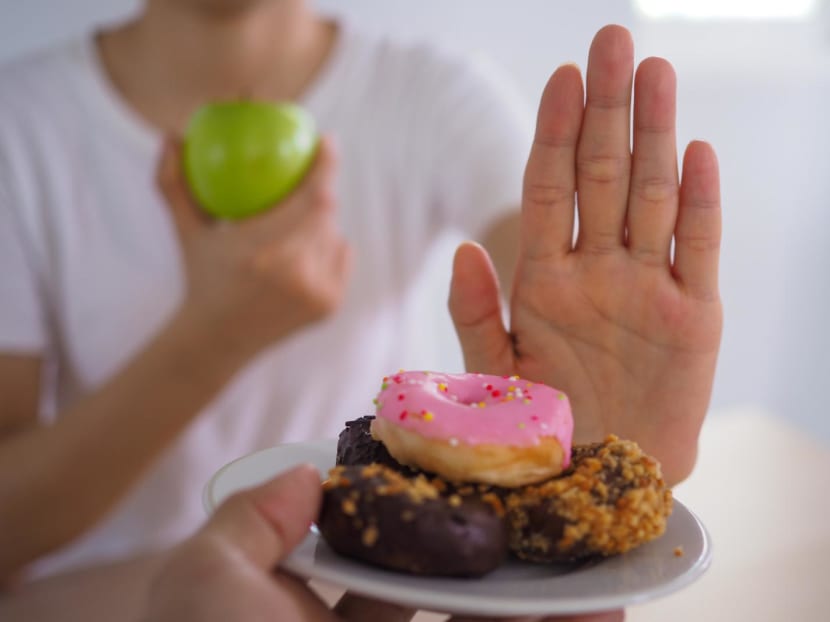Could the obsession to eat 'healthy' be an eating disorder? What to know about orthorexia nervosa
If you won’t eat unless the food is organic, GMO-free and has no carbs, additives, preservatives, artificial sugar or sodium – to the point of affecting your relationships and social life – you’re not just being picky.

The preoccupation with eating only what one perceives as healthy food is an eating condition known as orthorexia nervosa. (Photo: iStock/Nuttawan Jayawan)
Imagine someone who eats nothing but plain, frozen yoghurt for breakfast, lunch and dinner every single day. The motivation to stick to this perceived “healthy” and “complete” food is so strong that even holiday destinations are based on the availability of frozen yoghurt.
Or the workout buddy who is so fussy about the fat, sodium and sugar contents of his meals that he will never touch fast food or bubble tea – and openly judges you if you do. Online order instructions from him are so long (“sauce on the side, less salt and sugar, no fried shallots, kopi peng gau siew dai”), you run out of character space.
While it is one thing for the health-conscious or fitspo crowd to be fastidious about their diet (you don’t want to undo all the gains that you’ve worked so hard for, do you?), it is quite another to restrict food to such an extent.
In fact, the preoccupation with eating only what one perceives as healthy food is an eating condition known as orthorexia nervosa, said Dr Tay Yi Hang, an associate consultant in psychological medicine at Khoo Teck Puat Hospital.
“In milder cases, the individual may spend a huge amount of time and effort sourcing for and purchasing the food, or planning and preparing the meals,” said Dr Tay. “This all-consuming obsession may interfere significantly with his academic or vocational performance, or it could affect his social life.”
Unlike the better-known eating disorders such as anorexia nervosa and bulimia, “there is currently no published data on the incidence or prevalence of orthorexia nervosa in Singapore”, said Dr Tay.
The reason for this is “likely because orthorexia nervosa is yet to be classified as a formal psychiatric diagnosis” internationally, said Dr Zheng Zhimin, a consultant psychiatrist with Nobel Psychological Wellness Centre (Ang Mo Kio), a member of Healthway Medical Group.
Dr Zheng does encounter one or two cases a month but the restrictive eating pattern is often not the primary issue. “The patient usually presents with mood and/or anxiety issues and may have obsessive compulsive tendencies.”
Clinical and sports dietitian Jaclyn Reutens from Aptima Nutrition & Sports Consultants said that she has noticed an increase in the number of cases she has seen over the past decade. “I used to see only a handful over three to six months but now, it is at least a handful a month.”

Despite the rise in cases, she said the condition is “hard to diagnose as they can appear physically well and most of them do not know they are suffering from it”. “Some come to see me to eat more healthily and are unaware of the unnecessary rules around food they are imposing upon themselves.”
HOW DOES ORTHOREXIA NERVOSA AFFECT YOU AND YOUR LOVED ONES?
What’s so wrong with trying to eat healthy? Haven’t we been told to do that all our lives? It depends on what food beliefs the patient is obsessed with, said Reutens.
“For example, if the person deems carbohydrates are bad, he will eliminate an entire food group, which can lead to drastic weight loss, fatigue and irritability.” The common nutritional deficiencies that can result, she said, involve zinc, iron, calcium and protein, which can lead to hair loss, lethargy, loss of muscle mass, brittle or weak nails, low immunity and dry skin.
In case you're wondering why cutting out carbs can lead to a protein deficiency, protein is what your body switches to for energy when there is a carbohydrate shortage, and especially when you're also on a low-fat diet.

If the person is determined to cut out preservatives, you may not see obvious physical changes because no major food groups have been omitted, said Reutens, but there will still be adverse effects on his mental health.
“It is mentally draining to live with orthorexia nervosa,” she said. “The person thinks about what he’s going to eat for the entire day the moment he wakes up. For the rest of the day, he’s thinking about how to ‘perfect’ his diet even more based on his own set goals that are usually unrealistic.”
Frustration comes in when the patient is unable to find sufficient sources of “healthy” food, said Dr Tay. And this “violation of self-imposed dietary rules can cause a sense of personal impurity, low self-esteem, guilt, anxiety or even an exaggerated fear of disease”.
That’s not all the damage the eating disorder can create. Individuals with orthorexia nervosa tend to avoid social settings, where they would have difficulties exerting control over food consumption, said Dr Zheng. “This can result in a negative impact on social relationships as eating together is often a way to bond.”
Patients “may also exert such control over their loved ones’ food consumption patterns, such as their children, due to fears of them being unhealthy”, he said.
WHO IS VULNERABLE TO ORTHOREXIA NERVOSA?
Orthorexia nervosa is believed to stem from “underlying perfectionism, rigidity, poor self-esteem or an unstable sense of self”, according to Dr Tay. “Being in an environment with an excessive focus on diets, such as being an athlete or being in a health-related field, has also been shown to be one of the risk factors for orthorexia nervosa.”
Dr Zheng said that individuals with a history of obesity and poor body image may also have a tendency of developing the eating disorder “to exert control over their weight and perceived ‘ideal’ body image”.

DO YOU HAVE ORTHOREXIA NERVOSA OR ARE YOU JUST PICKY?
If, by being fussy about your food, you’re avoiding social gatherings, your relationships are affected, and you’re feeling anxious and guilty, there is a chance that you may have orthorexia nervosa, said Dr Zheng.
“It is an extreme obsession about the types of food that is ‘safe’ to consume and results in very restrictive eating patterns. Simply put, it is way more severe than just being picky with food.”
Conversely, picky eating can become a problem if it starts to affect all those abovementioned aspects of your life, said Dr Tay. Picky eaters are at risk when their “self-worth or self-identity is almost wholly dependent on compliance with their perceived healthy diet”, or “when the pursuit of ‘healthy’ eating leads to malnutrition or severe weight loss”.

WHAT HELP IS AVAILABLE?
As orthorexia nervosa is not a recognised mental disorder, there is “currently limited literature on evidence-based treatments” for it, said Dr Tay. “However, as with other forms of eating disorders, a holistic approach” involving a team of psychologists, psychiatrists and dietitians may be roped in to restore normal eating patterns and a healthy body weight as well as to treat any psychiatric conditions.
Anxiety and other mood disorders can be addressed through talk therapy to establish healthier thinking patterns with regards to one’s self-worth and relationship with food. Medications such as antidepressants may also be prescribed to reduce obsessive thoughts and anxiety.
Other than meal planning, dietitians can help take care of refeeding syndrome, which can be potentially fatal when an individual suddenly undergoes rapid refeeding after a long period of under-nutrition.

KNOW SOMEONE WITH ORTHOREXIA NERVOSA?
Individuals with the condition can be anxious about eating, said Dr Zheng, so be sensitive and avoid making comments that may cause them to feel ashamed.
For starters, don’t comment on the person’s food choices, said Reutens. Instead, share a well-balanced meal consisting of food from all essential food groups with him, said Dr Tay.
“Avoid the topic of diet or talking about guilt or shame about what you have eaten,” added Dr Tay. “Talk about the importance of self-care and nourishment, and celebrate all kinds of food as a source of pleasure and sustenance, regardless of their origins or contents.”
Outside of mealtimes, “don’t focus or comment on his appearance”, said Reutens. “A seemingly innocent remark like ‘you look well’ can be triggering for someone with an eating problem.”
If the opportunity to talk about his food choices comes up, be gentle with the person. “You cannot force someone to change his belief system. If you do, it may backfire as he will try to convince you he is okay even when he is not,” she said.







